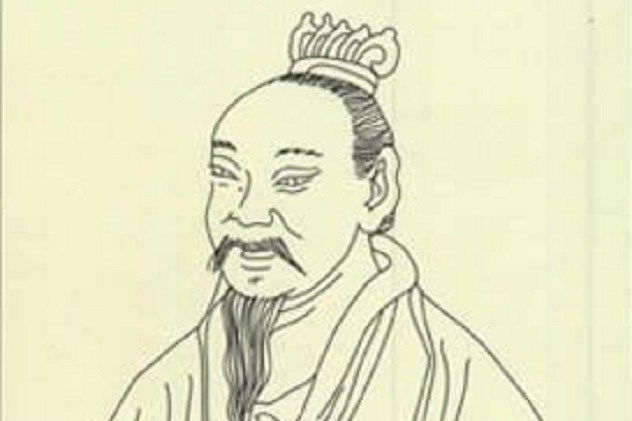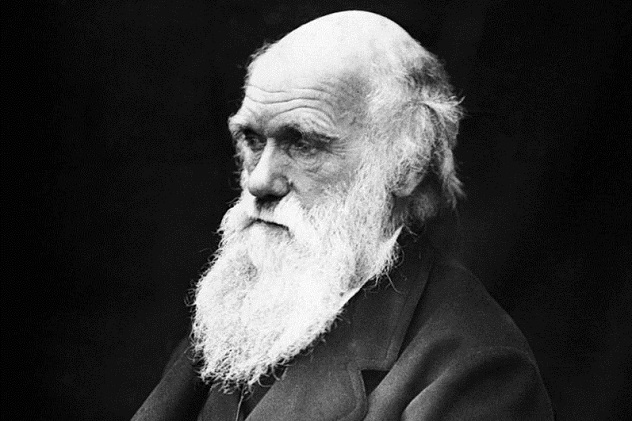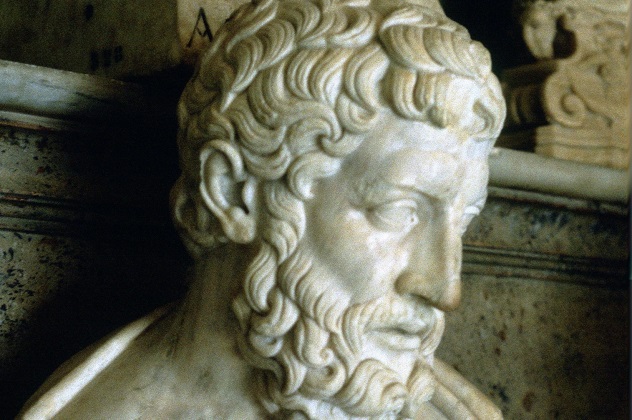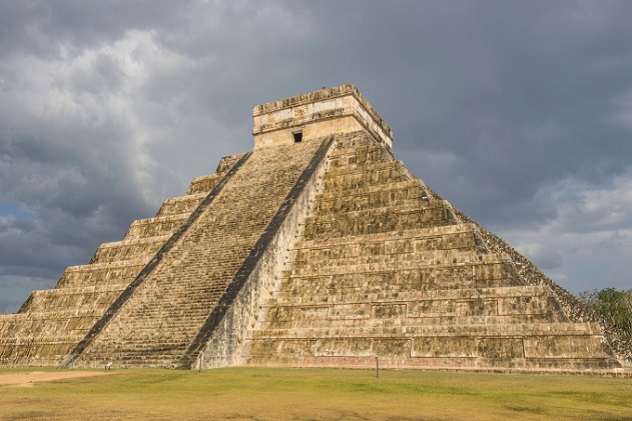 History
History  History
History  Health
Health 10 Everyday Activities That Secretly Alter Consciousness
 History
History Top 10 Historical Disasters Caused by Someone Calling in Sick
 Animals
Animals 10 New Shark Secrets That Recently Dropped
 Movies and TV
Movies and TV 10 Forgotten Realities of Early Live Television Broadcasts
 Technology
Technology 10 Stopgap Technologies That Became Industry Standards
 Weird Stuff
Weird Stuff 10 Wild Facts About Taxidermy That You Probably Didn’t Know
 Travel
Travel 10 Beautiful Travel Destinations (That Will Kill You)
 Miscellaneous
Miscellaneous 10 Modern Marriage Rituals Born from Corporate Branding
 Weird Stuff
Weird Stuff Ten Bizarre Visions of 2026 from Fiction
 History
History 10 “Modern” Problems with Surprising Historical Analogs
 Health
Health 10 Everyday Activities That Secretly Alter Consciousness
 History
History Top 10 Historical Disasters Caused by Someone Calling in Sick
Who's Behind Listverse?

Jamie Frater
Head Editor
Jamie founded Listverse due to an insatiable desire to share fascinating, obscure, and bizarre facts. He has been a guest speaker on numerous national radio and television stations and is a five time published author.
More About Us Animals
Animals 10 New Shark Secrets That Recently Dropped
 Movies and TV
Movies and TV 10 Forgotten Realities of Early Live Television Broadcasts
 Technology
Technology 10 Stopgap Technologies That Became Industry Standards
 Weird Stuff
Weird Stuff 10 Wild Facts About Taxidermy That You Probably Didn’t Know
 Travel
Travel 10 Beautiful Travel Destinations (That Will Kill You)
 Miscellaneous
Miscellaneous 10 Modern Marriage Rituals Born from Corporate Branding
 Weird Stuff
Weird Stuff Ten Bizarre Visions of 2026 from Fiction
10 Different Views On The Meaning Of Life
It’s a question that mankind has long struggled to answer. We’ve built philosophies and religions around it, gone to war over it, and debated it for centuries. Theories on just what the meaning of life actually is range from the optimistic to the mind-blowingly depressing, but they’re all pretty thought-provoking.
10The Cyrenaics

The Cyrenaics were an offshoot of the teachings of Socrates. The group was founded somewhere around 400 B.C. by one of Socrates’s students, a North African man named Aristippus. According to their beliefs, everyone’s knowledge and experience is subjective, based only on what has happened to them. They believed that truth is an innately personal thing, and no one can experience the world quite like another person does. They also believed that we can’t know anything for certain about the things and people around us, there is only what we feel for ourselves.
They taught that the only real goal in life should be pleasure in the present, that people should do what makes them happiest in the moment instead of planning for a future that, in the end, is always unknowable and uncertain. Physical pleasures were of the utmost importance, and all measures should be taken to maximize the amount of pleasure a person takes in the moment. The view was a very self-centered one, stating that a person’s own pleasure should take priority over the pleasure and overall goodness of the community, city, or populace.
There is a blatant disregard for not only the well-being of others in their philosophy but also for traditions and social norms. Aristippus taught that there was nothing inherently wrong with taboos like incest, it was only social convention that made it wrong. The true meaning of life is to ignore the restraints of social convention and do what is most pleasurable to yourself, in the moment.
9Mohism

Mohism developed in China at about the same time the Cyrenaics were establishing themselves in Greece. Named for its originator, Mo Di, the movement is notable for being one of the first organized philosophical groups in China who debated and argued ideas like the meaning of life. Their resulting texts outline 10 doctrines that they said people should strive to follow in their everyday lives, most of which espouse impartiality.
According to the doctrines, the meaning of life can only be achieved when every individual person shows the same amount of care and attention to every other person, putting no one’s needs above anyone else’s. That meant getting rid of wasteful luxury, entertainment for its own sake, and wealth. They wanted people to strive for equality, making sure that everyone had the same degree of happiness and comfort while honoring the wishes of the divine and helping everyone achieve the final goal in life: rewards in the afterlife.
8The Cynics

The Cynics are another group that descended from the teachings of Socrates, and according to them, the meaning of life was to live a moral existence that was more compatible with the natural order of things than with what they saw as the questionable ethics and social traditions of popular society. The Cynics recognized that many things that had become accepted tradition in their society, such as the hypocrisy and wealth they saw in temples, had little or nothing to do with helping people to live virtuous lives.
While they didn’t deride social convention completely, they said that each person should form their own thoughts about right and wrong, and follow the path of virtue even when it went against social norms. From this came the idea of parrhesia, or speaking the truth. Another important tenet of this philosophy was self-sufficiency, which meant being able to survive not just without the companionship of other people but without basic comforts or the need for possessions. It was only when someone turned their back on the need to be tied down by people or things that they were truly free, and freedom was the meaning of life.
7Albert Einstein

Albert Einstein will undoubtedly always have a place among the pantheon of mankind’s most brilliant minds. In 1951, a young woman wrote him a letter asking about his belief on the meaning of life, and his reply was short and poignant. “To create satisfaction for ourselves and for other people,” he wrote.
But letters between Einstein and his son, Eduard, show a deeper answer than that. In response to one letter, Einstein told his son that he believed in the “highest stage of consciousness as the highest ideal” and that mankind’s ability to think and create something from nothing is the greatest thing that we can do. He suggests that it’s this creation that will allow us to experience true happiness. He also stresses that it’s necessary to create not out of a desire to be remembered but for the love of the thing you are bringing into the world.
6Darwinism

Charles Darwin had something of a complicated relationship with religion and religious ideas about the meaning of life. Originally born into a Christian belief system, his ideas about God and the meaning behind what he was studying fluctuated greatly throughout his career.
It’s up for debate just how much of an effect Darwin thought the idea of a creator should have on how we live our lives—some texts imply that evolution itself is a deity-like idea, while others state that evolution created a human state that was designed to need some sort of supernatural creator to worship. But random chance and environmental pressures are all that is required for evolution to work, so what does that indicate for a higher meaning of life?
Darwin’s opponents insist that evolution and Darwinism suggests that the meaning of life is nothing than survival, but there are more complicated interpretations of his theories with regards to the meaning of life. One suggests that the meaning of life is different for everyone and every species—the point of the existence of a plant is very different from the point of the existence of a fish. One thing that many interpretations of Darwinism agree upon is that part of the meaning of life for any living organism is to pass their DNA on to the next generation.
5Nihilism

Perhaps the most common context in which we hear the term “nihilism” is from the Russian revolutionaries who denied the power of all traditionally accepted authoritarian bodies, such as the government and religion. While the ideas of nihilism are more complicated than that, the movement took its name with good reason.
A true nihilist believes that there is no such thing as value or knowledge, and there is no point whatsoever to a person’s existence. Friedrich Nietzsche argued that nihilistic beliefs would ultimately lead to the downfall of everything, because people would simply cease to care about anything. There is certainly no truth, and things that we think we believe in are only true until something better comes along. A quick look at the overwhelming number of scientific beliefs that have been debunked over the centuries seems to lend credence to this theory. Originally, the only thing that was believed to have a purpose of any sort was destruction, but later attempts to soften the image of the nihilist philosophy suggested a route of indifference instead.
The idea has captivated philosophers for centuries. According to Nietzsche, everything we see around us is an artificial construct that won’t last with the indifference of nihilism, a theory that’s supported by Oswald Spengler’s analysis of the attitudes that beckon the collapse of a society or civilization. Perhaps one of the most depressing theories on the meaning of life, nihilism says that there is no meaning, but that’s almost all right, because there’s really not much of anything.
4Tibetan Philosophy

Tibetan philosophy is a school of thought that developed in Tibet and other areas of the Himalayan Mountains. Very similar to Buddhism, Tibetan philosophy preaches one major goal in life: to end the world’s suffering. In order to do that, the first thing that you have to do is gain an understanding of the world and how it works. Through understanding, you will eventually come to the knowledge required to end suffering.
The philosophy also provides a path by which you can measure your personal milestones, from being a “Person of Small Ability” who is most concerned with themselves to being a “Person of Great Ability” who takes suffering away from others by suffering themselves. It’s one thing to believe a certain way, but the true meaning of life is found by those who practice what they believe and act in such a way that benefits others above themselves. Tibetan philosophy is also unique in that whatever point in the path a follower is on, they have a clear set of instructions for getting closer to the true meaning of life.
3The Epicureans

The Epicurean philosophy is often oversimplified. According to the teachings of Epicurus, everything is made up of tiny particles, including the human body, which is made up of soul particles. Without these particles, the body is dead, and without a living body, the soul particles are incapable of feeling anything. Because of this dual existence, no part of the human can survive after death. There is no eternal rest or torment, no great reward to work toward, and no great punishment to avoid. That means that all you have is what you have on Earth, so while you’re here, you need to make the most of it.
Soul particles are what allow us to feel pain and pleasure, and that’s where the Epicurean’s meaning of life comes from: maximize pleasure, minimize pain. This isn’t as easy as it sounds, because one of our main sources of pain and anxiety comes from either abstract concepts that we can’t see or control or desires that we have no way of fulfilling. For example, the idea of death is one we often look upon with fear and dread. The Epicurean ideal says that it’s something we need to come to terms with not being able to control.
That doesn’t mean, however, that we should go out and do whatever we want. If we think that robbing a bank might lead to some pleasurable consequences, we can’t use Epicurean philosophy as a reason to do it. Epicurus says that behaving in a good, just manner is vital to the pleasure principle, because the guilt and anxiety of getting caught can eat away at us and eventually cause pain. One of the most important aspects of the Epicurean meaning of life is the cultivation of friendships, as friendship is one of the most pleasant, secure, safe, and everlasting feelings to which mortal man can aspire.
2Aztec Philosophy

According to the Aztecs, the ultimate meaning of life was to live in balance with nature and allow the continuation of the energy that gives rise to each generation. That energy, called teotl, isn’t so much a deity as kind of like the Force. It’s an energy that surrounds all living things, joining everything we know and everything that’s beyond our knowledge. Because teotl is always moving and changing, so is the universe, and it’s up to mankind to make sure they live in harmony with that.
Teotl is even more than that, though, as it exists in the form of polar opposites whose struggle against each other maintains the end balance of the universe. Because of these opposing natures, life and death aren’t thought of as good and bad but simply part of the cycle. The Aztecs believed that they were on a precarious point between the two, and it was of the utmost importance to stay in the middle, maintaining balance and not enjoying wealth or excess but living wisely and goodly.
The goals outlined in Aztec wisdom are to live in such a manner that future generations may enjoy the same good life that you did, make sure your actions keep the cycle of life going, and honor the mysterious sacred force that makes life possible. In many texts, earthly life is described as being filled with pain and sadness, and the only thing that can give the world meaning is taking small joy in the simple pleasures of life while ensuring the survival of the cycle.
1Stephen Fry And The Humanists
Stephen Fry’s narration of the humanist video above puts the question of the meaning of life in a perspective that relates to anyone, no matter what their belief system, age, race, or gender. According to Fry—and the humanists—there is no specific meaning of life. Everyone has their own meaning or meanings. Instead of looking to the universe for meaning, people should look inside themselves to discover what makes them happy and gives their own life meaning. The only meaning is that we give to our actions, connections, desires, and the legacy we leave for future generations.
Because everyone is different, the meaning of life is different for all of us. For some, it might be creating a great work of art. For others, it might be establishing a scholarship. It could even be as simple as creating a garden, adopting a child, or adopting an animal in need. There’s no right or wrong meaning of life or any mysterious answer out there—rather, it is a mysterious answer within ourselves.
Most important to this theory is the answer to how to be happy. It’s a deceptively simple answer, and one that many other schools of thought and philosophy overlook: simply living life as completely and fully as possible.








